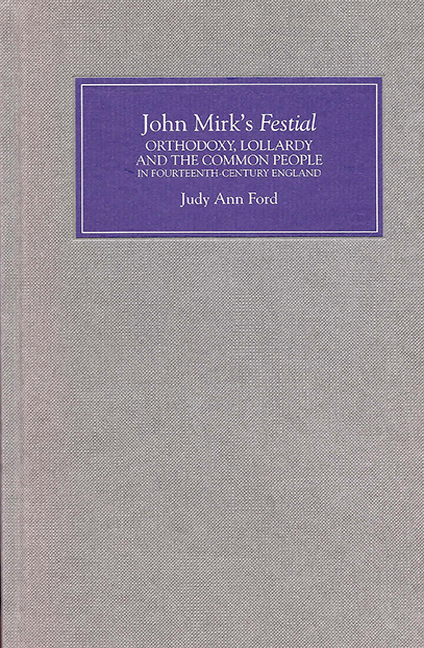Book contents
- Frontmatter
- Acknowledgements
- Contents
- Introduction: John Mirk's Festial and Fourteenth-Century England
- 1 Popular Culture and the Study of Late Medieval Piety
- 2 Clerical Power and Lay Agency
- 3 Secular Authority and Rebellion
- 4 Biblical Authority and Oral Tradition
- Conclusion: The Festial and Popular Piety in Late Medieval England
- Bibliography
- Index
2 - Clerical Power and Lay Agency
Published online by Cambridge University Press: 11 May 2017
- Frontmatter
- Acknowledgements
- Contents
- Introduction: John Mirk's Festial and Fourteenth-Century England
- 1 Popular Culture and the Study of Late Medieval Piety
- 2 Clerical Power and Lay Agency
- 3 Secular Authority and Rebellion
- 4 Biblical Authority and Oral Tradition
- Conclusion: The Festial and Popular Piety in Late Medieval England
- Bibliography
- Index
Summary
‘… þys man toke a prest and schrof hym.’
(‘… this man took a priest and confessed himself.)
John Mirk, sermon for Tercia Quadragesime SundayLay Agency in the Festial
One of the most remarkable achievements of Mirk's sermons is their ingenious synthesis of the notion of a dynamic, self-directed laity actively pursuing salvation with that of a vision of Christianity in which salvation is impossible without the intervention of priests. In the sermons of the Festial the laity are required to participate in the sacraments administered by the clergy, yet the narratives about the struggle to achieve salvation are structured in such a way that lay people are the central characters and clergy essential but dramatically marginal figures. Mirk thus promotes orthodoxy through the imagery of its opposition.
Throughout the Festial, exempla present lay characters who, like the woman with a sin too embarrassing to confess, are distinguished by their exercise of free will. The men and women of these narratives face Christ to be saved or damned on their own terms. In some narratives the clergy take center stage, but in most the principal characters are laity who wrestle with questions of faith, morality, and salvation against the background of a sensational world in which encounters with the divine and demonic are frequent, and the miraculous appears repeatedly. The lay people in these stories are diverse, ranging from devout to contumacious, and from pauper to emperor; some are virtuous, some contrite, and some defiantly unrepentant. Despite their differences, they share an unmistakable freedom of action, an ability to chose a course of action independent of clerical control.
In many ways Mirk's sermons celebrate lay agency, yet they subsume that agency into a larger structure of clerical dependence. Mirk's priests, however minor they may be as characters and however much their actions take place off-stage – that is, outside the exempla narratives – nevertheless possess a crucial authority inaccessible to those who are not ordained: only priests can provide absolution from sin through auricular confession, and only priests can perform transubstantiation – that is, transform bread and wine into the body and blood of Christ during the liturgy of the mass. The laity of Mirk's sermons pursue paths of their own choosing, but all roads leading to salvation run unswervingly through a church in which the ability to perform essential sacraments is held by the clergy alone.
- Type
- Chapter
- Information
- John Mirk's FestialOrthodoxy, Lollardy and the Common People in Fourteenth-Century England, pp. 32 - 69Publisher: Boydell & BrewerPrint publication year: 2006



